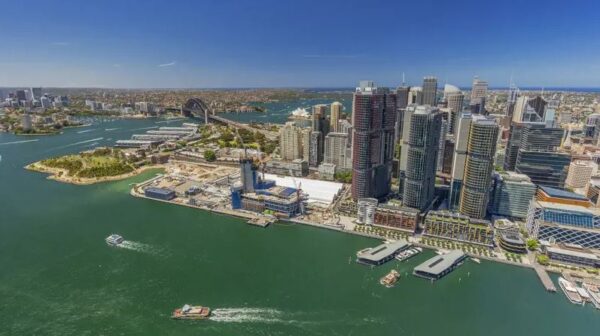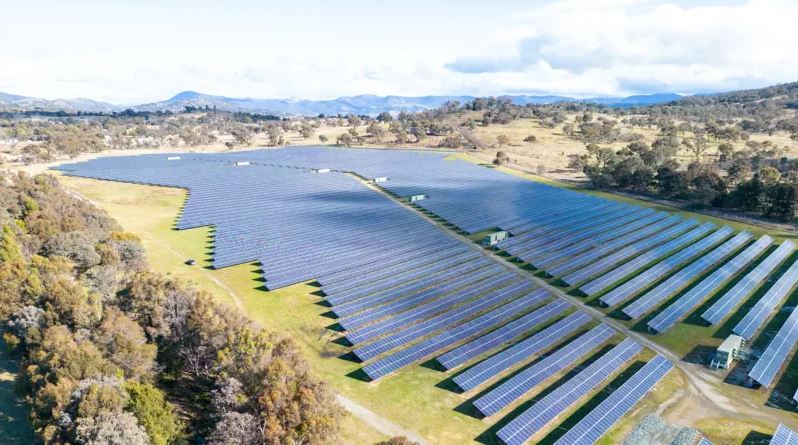New South Wales government agency Infrastructure NSW (INSW) announced it has formalised a $48 million (USD 31.5 million) green product purchase agreement that will see CleanPeak Energy add an additional four solar farms to the development pipeline. It is anticipated the new solar farms will add more than 50 GWh of clean energy to the state’s renewable energy supply.
“This landmark agreement with INSW provides an opportunity for CleanPeak to make substantial investments in regional NSW and build new renewable energy projects, adding to our growing portfolio of projects that are accelerating Australia’s clean energy transition,” CleanPeak Chief Executive Officer Philip Graham said.
“CleanPeak operates the Barangaroo energy precinct, delivering electricity and thermal services and this agreement is consistent with our mission to deliver a 100% reliable and renewable energy supply to our customers”.
INSW said CleanPeak, which owns the behind-the-meter electricity network that supports the Barangaroo development, will supply the state government with renewable energy certificates over a 25-year period from 2025 at a “fixed and competitive” rate.
The agency said CleanPeak’s capacity to generate clean energy from the new solar farms as well as renewable energy certificates will allow Barangaroo’s grid-supplied electricity consumption – or scope 2 carbon emissions – to be completely offset.
INSW said the deal ensures Barangaroo can achieve carbon neutrality without tenants in the 7.5-hectare commercial and residential precinct needing to enter individual renewable energy contracts, meaning they can source electricity from a provider of their choosing.
“By entering into this groundbreaking agreement, Barangaroo has ensured both its carbon neutrality and a sustainable energy future for the long term,” INSW said, noting that the purchase of green products will be funded by levies collected by the state government from Barangaroo’s building owners.

Image: INSW
CleanPeak said construction of the first two new solar farms, being developed near Moama and Hay in NSW’s southwest, is expected to begin early next year with more projects to follow once planning and regulatory approvals have been acquired.
The Moama and Hay projects, which will both utilise single axis trackers, are expected to each generate more than 25 GWh of renewable electricity annually with CleanPeak Chief Operating Officer Jon Hare noting that the company is planning to install batteries at each of the sites.
“Our plan is to add a battery energy storage system at each site, which will provide the flexibility to better match solar generation with each customer’s consumption profile providing the reliability in renewables that our customers need,” he said.
The deal is the latest shift into utility scale solar for CleanPeak which established itself as a developer of major commercial projects.
In November, the Sydney-headquartered company acquired three operating solar farms with a combined capacity of 14.3 MW. The purchases include the 11 MW Williamsdale Solar Farm and the 2.3 MW Mount Majura Solar Farm in the Australian Capital Territory (ACT), and the 1 MW Karratha Solar Farm in Western Australia. Earlier this year it acquired the 13 MW Mugga Lane Solar Park near Canberra and commenced construction of the 30 MW Wangaratta Solar Farm project being developed in northeast Victoria.
The solar farms add to CleanPeak’s portfolio of C&I energy projects which include more than 50 MW of rooftop solar and 35 MWh of battery energy storage either in operation or under development.
CleanPeak, in conjunction with Igneo Infrastructure Partners, also owns the Barangaroo South precinct’s District Energy Infrastructure, having acquired the behind-the-meter system from developer Lendlease in mid-2022 in a deal estimated to have been worth up to $150 million.
The infrastructure, much of it housed in a 77,000-square-metre space built below Barangaroo, includes 52 MW of thermal energy assets, along with the embedded electricity network and solar assets that supply the precinct.
This content is protected by copyright and may not be reused. If you want to cooperate with us and would like to reuse some of our content, please contact: editors@pv-magazine.com.









1 comment
By submitting this form you agree to pv magazine using your data for the purposes of publishing your comment.
Your personal data will only be disclosed or otherwise transmitted to third parties for the purposes of spam filtering or if this is necessary for technical maintenance of the website. Any other transfer to third parties will not take place unless this is justified on the basis of applicable data protection regulations or if pv magazine is legally obliged to do so.
You may revoke this consent at any time with effect for the future, in which case your personal data will be deleted immediately. Otherwise, your data will be deleted if pv magazine has processed your request or the purpose of data storage is fulfilled.
Further information on data privacy can be found in our Data Protection Policy.